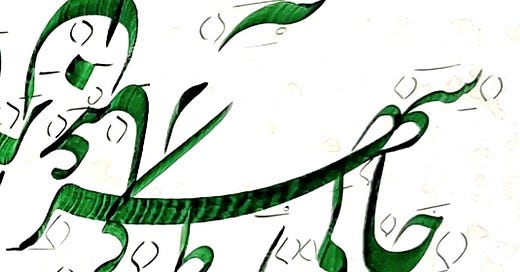There is a popular debate about Nastaliq versus Nashk scripts among the Perso-Arabic script-based language communities. Urdu is most commonly written in Nastaliq while common day Arabic and standardised religious texts adopt Nashk. To the untrained eye, technology developers, and non-natives, it looks like a calligraphy-versus-serif debate—a bunch of bourgeois making noise about the default Unicode standard being Nashk and disregarding it as a beautiful calligraphic dream.
But Nastaliq is varied, practical, and easier to read and write. While Naskh may have only 4 basic character shapes, Nastaliq contains 32—Nastaliq is elongated, overlapping, unspaced, non-monotonic, and artistically pronounced.1 All of these are lost in the digital transcription. The Android, Windows, and web systems do not have a default Nastaliq font for Urdu and transcribe it in Nashk—much like Substack sulling the Urdu lyrics in this newsletter. Moreover, the Urdu and Hindi-speaking population is divided across borders and different scripts. Though they watch each other’s media, they mostly cannot read each other’s books. A representation of their differences:2
These are the main reasons that transliteration or romanization in texting, pop culture, and media have indubitably become a staple of the current generation. To pass off a lie of standardisation, TARJUMAN aspires to follow a regulated transcription guide. The one presented below is referenced from the IPA guide of Hindi and Urdu3, Rekhta4 and a research paper on Urdu and Hindi transliteration5.
Some Dictionaries
Arabic Script Based Language Character Recognition: Nasta’liq vs Naskh Analysis, Saeeda Naz et al. [DOI:10.1109/WCCIT.2013.6618740]
Towards AI-Enabled Approach for Urdu Text Recognition: A Legacy for Urdu Image Apprehension, Kamlesh Narwani et al. [DOI:10.1109/ACCESS.2022.3203426]
Rekhta’s Transliteration Key (in English)
Hindi to Urdu Conversion: Beyond Simple Transliteration, Bushra Jawaid and Tafseer Ahmed [CorpusID:14177761]








excellent breakdown! i've always wondered about the difference between naskh and nastaliq, thank you for sharing this!!
Love the concept of this newsletter! I'm trying to improve my Urdu and am looking forward to future posts.